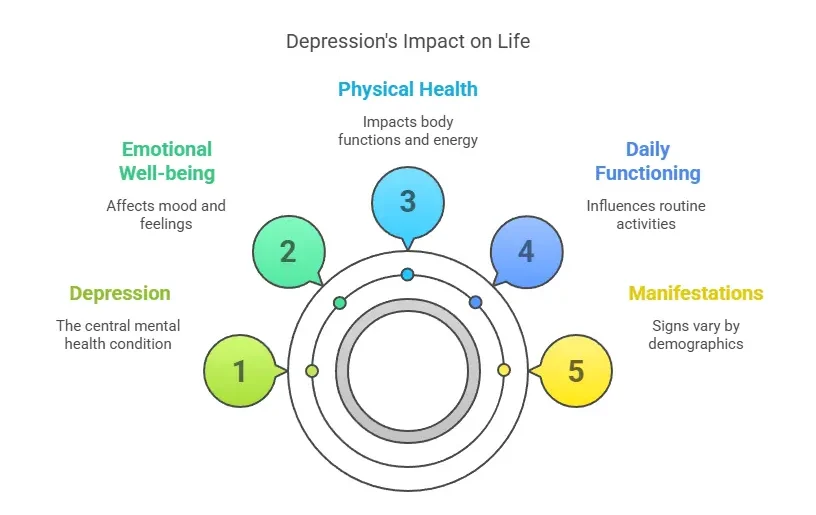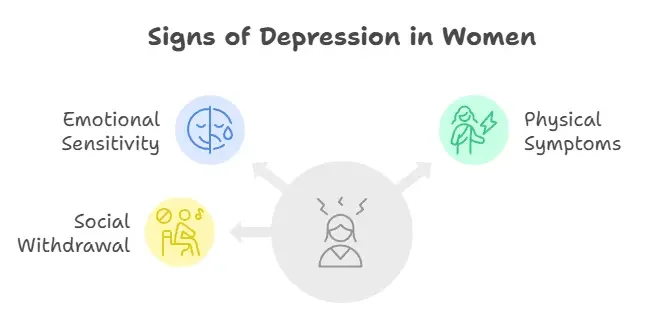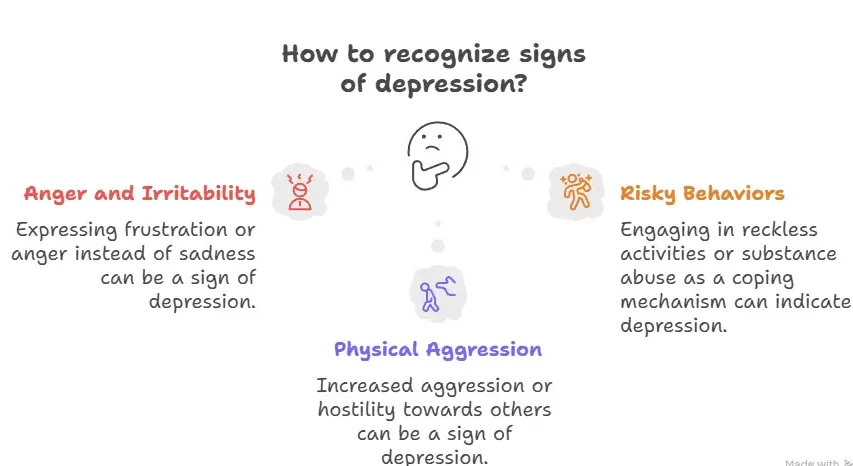Depression is a complex mental health condition that affects millions of people worldwide. It can manifest in various ways, impacting emotional well-being, physical health, and daily functioning. Understanding the signs of depression is crucial for recognizing when someone may be struggling, whether it’s yourself or a loved one. This blog aims to shed light on the emotional, physical, and behavioral signs of depression, highlighting how they can differ based on gender, age, and life stage.

What Are the General Signs of Depression?
Depression can present itself through a range of symptoms, which may vary from person to person. Here are some common signs to look out for:
- Persistent Sadness: A feeling of emptiness or hopelessness that lasts for weeks.
- Loss of Interest: A noticeable disinterest in activities once enjoyed, such as hobbies or socializing.
- Fatigue: Constant tiredness or lack of energy, even after adequate rest.
- Changes in Sleep Patterns: Insomnia or oversleeping can both be signs of depression.
- Appetite Changes: Significant weight loss or gain due to changes in eating habits.
- Difficulty Concentrating: Trouble focusing on tasks or making decisions.
- Feelings of Worthlessness: Harsh self-criticism or feelings of inadequacy.
Recognizing these signs early can be key to seeking help and finding effective coping strategies.
Signs of Depression in Women
Women may experience unique signs of depression due to hormonal fluctuations and societal pressures. Some specific signs include:
- Emotional Sensitivity: Increased emotional responses, such as crying spells or irritability.
- Physical Symptoms: Chronic pain or fatigue that doesn’t have a clear medical cause.
- Social Withdrawal: A tendency to isolate from friends and family, leading to loneliness.

For example, a woman may find herself withdrawing from social gatherings she once enjoyed, feeling overwhelmed by the demands of work and family life.
Signs of Depression in Men
Men often exhibit different signs of depression, which can lead to under diagnosis. Common signs include:
- Anger and Irritability: Expressing frustration or anger instead of sadness.
- Risky Behaviors: Engaging in reckless activities or substance abuse as a coping mechanism.
- Physical Aggression: Increased aggression or hostility towards others.

A man might channel his feelings into workaholism or aggressive sports, masking his emotional struggles.
Signs of Depression in Teens and Girls
Teenagers may show signs of depression that differ from adults. Key indicators include:
- Mood Swings: Intense emotional fluctuations that seem disproportionate.
- Declining Academic Performance: A drop in grades or lack of interest in school.
- Changes in Friendships: Withdrawal from friends or changes in social circles.
For instance, a teenage girl might suddenly stop attending her favorite extracurricular activities, isolating herself from friends.
Signs of Depression in Pregnancy
Pregnancy can be a time of joy, but it can also bring about signs of depression, including:
- Persistent Sadness: Feeling overwhelmed or hopeless about the future.
- Anxiety: Excessive worry about the baby’s health or parenting abilities.
- Physical Symptoms: Fatigue and changes in appetite that affect overall health.
Recognizing these signs is crucial for expecting mothers to seek support and care.
How Depression Shows on the Face and Body
Depression can manifest physically, making it visible to others. Signs include:
- Facial Expressions: A flat or sad expression, lack of eye contact, or a forced smile.
- Posture: Slumped shoulders or a lack of energy in movements.
- Skin Changes: Dull skin or noticeable weight changes.

These physical signs can often be the first indicators that someone is struggling.
How to Overcome Depression?
If you or someone you know is experiencing signs of depression, consider these coping strategies:
- Reaching Out for Therapy: Professional help can provide valuable support and coping mechanisms.
- Building Routines: Establishing daily habits can create a sense of stability.
- Talking to Trusted People: Sharing feelings with friends or family can alleviate burdens.
- Practicing Mindfulness: Engaging in self-care activities like meditation or yoga can improve mental health.
At Manchaitanya Mind & Health Care, we offer resources and support for those struggling with depression.
If you recognize any signs of depression in yourself or a loved one, please reach out for help. You are not alone, and there is support available to guide you through this challenging time.






